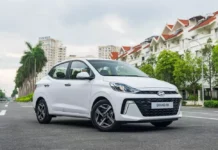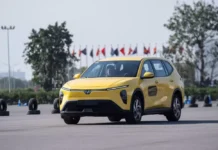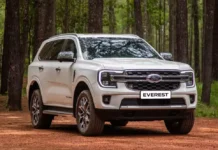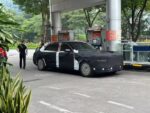
|
|
Chinese President Xi Jinping shakes hands with Huawei founder Ren Zhengfei prior to a meeting with Chinese private enterprises. Photo: Xinhua. |
On February 17, Chinese President Xi Jinping met with over a dozen founders and CEOs of some of the country’s largest corporations. This was the first time since 2018 that Xi Jinping hosted such a high-level gathering of top business leaders.
Image of Jack Ma Standing and Clapping Draws Attention
Among the attendees, the presence of Jack Ma, founder of Alibaba, drew significant attention from international media. After being under tight government scrutiny since 2020, he had largely remained out of the public eye following the regulatory crackdown on the tech sector that year.
Images broadcast by CCTV on February 17 showed the billionaire standing up and clapping, along with over a dozen other businessmen, as President Xi entered the room. This image became a focal point for investors.
“Jack Ma was sitting in the front row. That means private enterprises are still very important,” said Li Chengdong, director of the Haitun e-commerce consulting center, to the Financial Times.
|
Images of Xi Jinping shaking hands with Jack Ma (left) and Jack Ma standing and clapping (right). Photo: CCTV. |
Ding Shuang, China economist at Standard Chartered Bank, remarked that Jack Ma’s presence at the conference was the strongest signal to date that the Chinese government is seeking to restore confidence in the private sector.
At the conference, Xi emphasized that China’s private sector has a “broad prospect and huge potential” for creating wealth and opportunities. “Now is the right time for private enterprises and entrepreneurs to show their talent,” he declared.
Jack Ma was seated in the center row, facing Xi Jinping but slightly offset to the left, about four seats away from the middle group. CCTV footage showed the Alibaba founder taking diligent notes as the Chinese President spoke.
In addition to Jack Ma, the conference brought together leaders from major Chinese tech, manufacturing, and energy companies, according to Reuters. This included Huawei’s founder, Ren Zhengfei. Huawei has become a symbol of China’s efforts to withstand US pressure. The company released a flagship smartphone using domestic chips in 2023.
Lei Jun, CEO of Xiaomi, was also in attendance. As the world’s third-largest smartphone manufacturer, Xiaomi expanded into the electric vehicle market last year with its SU7 sports car model. The company also made a technological breakthrough by developing China’s first 3nm smartphone chip.
CCTV footage also showed Huawei’s founder, Ren Zhengfei, and Xiaomi’s leader, Lei Jun, reading prepared statements before the Chinese President spoke.
The founder of DeepSeek, Liang Wenfeng, was also present. This AI startup made waves in the market by introducing AI models that rival or surpass top American products at a fraction of the cost.
Only 3 Tech Giants Were Absent
Additionally, the conference gathered other prominent figures from China’s tech sector and various other industries, such as Wang Chuanfu (BYD, China’s top electric vehicle maker), Ma Huateng (Tencent, a leading tech conglomerate), Wang Xing (Meituan, a food delivery and services app), Wang Xingxing (Unitree, a humanoid robot company), Zeng Yuqun (CATL, the world’s largest battery maker), Yu Renrong (Will Semiconductor, a semiconductor components manufacturer), Qi Xiangdong (Qi An Xin Technology, a cybersecurity firm), Nan Cunhui (Chint Group, a solar energy company), and Leng Youbin (China Feihe, China’s oldest powdered milk company), and Liu Yonghao (New Hope, China’s largest feed producer).
On social media, investors analyzed the seating arrangement at the forum to gauge the importance of each enterprise to the Beijing government. The founder of Unitree was seated in the center, next to Huawei’s Ren Zhengfei. Others in the front row included the CEO of Will Semiconductor and the founder of the agricultural conglomerate New Hope. Jack Ma was seated in the same row but slightly offset to the left from Xi Jinping’s perspective, by a few seats.
Those invited were either leaders in their respective industries or played a crucial role in safeguarding China’s industrial supply chains through technological innovation, according to Su Yue, a key economist at EIU (Economist Intelligence Unit), in an interview with SCMP.
|
This is the first time in years that Xi has held a high-level meeting with private businesses. Photo: Xinhua. |
However, three notable tech giants were absent from the event: ByteDance (TikTok’s parent company), JD.com (a major e-commerce company), and Baidu (focused on AI and search engines). The lack of representation from these companies caused JD.com’s shares to drop by 3% and Baidu’s by over 8%, the sharpest fall in the Hang Seng Tech index, which represents top Hong Kong-listed tech firms, on that day, according to The Guardian.
Wang Huning, one of China’s top political theorists, co-chaired the meeting with Xi Jinping. He praised the Chinese President’s speech as “insightful” and urged entrepreneurs to “study and implement” his instructions to open a new chapter in the development of private enterprises.
In his address, Xi assured that economic policies toward the private sector would not change. He called on entrepreneurs to “be brimming with entrepreneurial spirit and patriotism, constantly enhance their sense of social responsibility, and improve their international vision.”
The Chinese President also emphasized that all enterprises, regardless of ownership, must strictly abide by the law. “Any illegal activities must be thoroughly investigated and dealt with,” he warned.
According to The Guardian, the meeting with private business leaders reflected the reality that the Chinese government is under pressure to boost economic growth. The regulatory clampdown on private enterprises in recent years may have damaged investor confidence, and this conference could be seen as an attempt to restore that confidence.
Christopher Beddor, China research vice president at Gavekal Dragonomics, commented, “It’s an implicit acknowledgment that the government needs the contribution of private enterprises in the tech competition with the US. They have no choice but to support the private sector if they want to catch up with the US.”
Little-Known Stories of Tech Billionaires
Tech Bookshelf brings readers the best books, distilling hundreds of hours of interviews with Steve Jobs, Elon Musk, and their associates. They contain fascinating, rarely revealed stories from the world of technology.












































